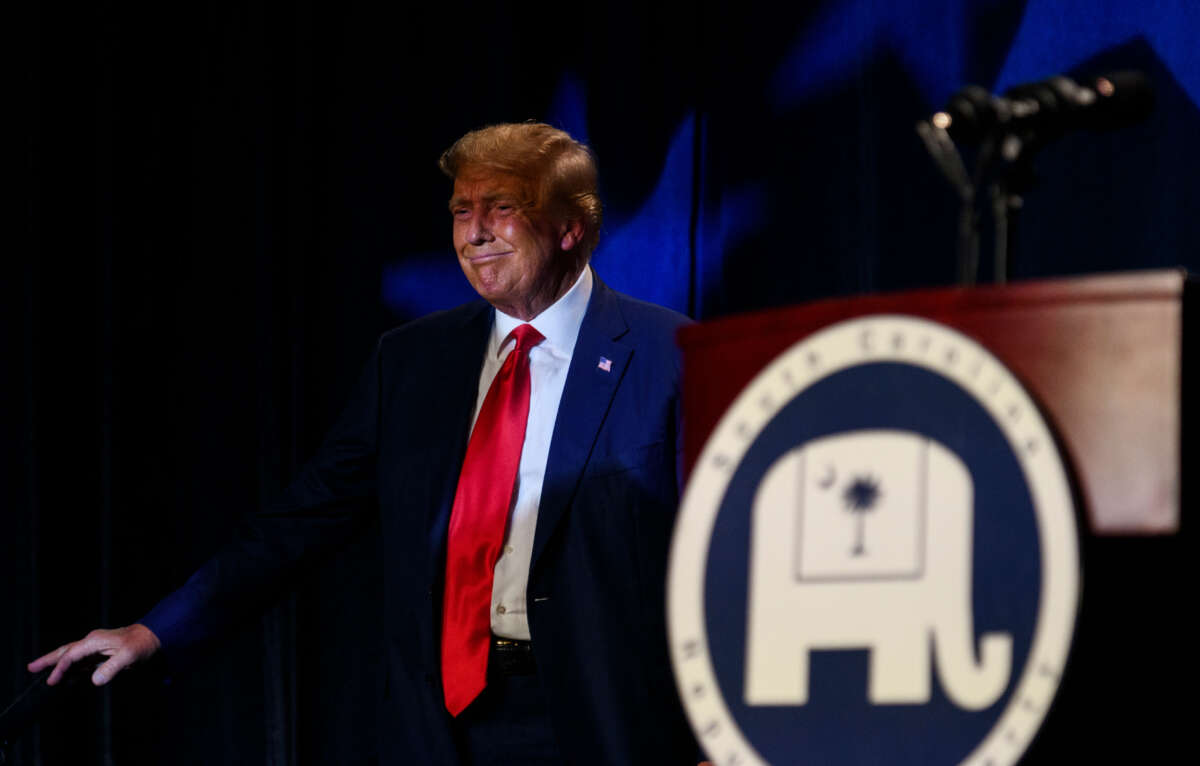Truthout is a vital news source and a living history of political struggle. If you think our work is valuable, support us with a donation of any size.
Former president and current presidential contender Donald Trump is refusing to sign the loyalty pledge that is required to take part in the Republican Party’s first 2024 primary debate.
The Republican National Committee (RNC) announced in June requirements for candidates to take part in the debate, which is set to be held on August 24 in Milwaukee, Wisconsin. In addition to reaching polling and fundraising goals, candidates must promise to support the nominee who is chosen by Republican voters in the primary election next year.
Since the RNC announcement, Trump hasn’t indicated whether or not he will abide by the rules — and he’s also failed to definitively state whether he plans to attend the debate at all.
In an interview with Newsmax’s Eric Bolling on Wednesday, Trump suggested that he had no intention of signing the pledge, but left open the possibility that he’d still attend the event.
Trump — by far the frontrunner in the GOP race for the presidential nomination — said that he wouldn’t back certain candidates who are qualified for the debate stage in the unlikely event that they become the Republican nominee.
“I wouldn’t sign the pledge. Why would I sign a pledge if there are people on there that I wouldn’t have?” he said, noting there were about “three or four people” who he wouldn’t back.
Trump also argued that his lead in the polls should allow him to forgo the loyalty pledge altogether.
“Why would you do that when you’re leading by so much?” he said.
When asked about candidates he wouldn’t support, Trump mentioned former Arkansas Gov. Asa Hutchinson and former New Jersey Gov. Chris Christie, who Trump asserted would “ask me nasty questions” at the debate.
The former president also said he was still considering participating in the debates. “I haven’t totally ruled it out,” he said.
Trump was similarly reluctant to sign a GOP loyalty pledge during his first presidential run in 2016. Although he ultimately relented, he later retracted his promise to support the eventual nominee.
That year’s loyalty pledge was not a prerequisite for candidates to be permitted on the debate stage, though they were pushed by party leaders to sign the pledge regardless.
It’s unclear what the RNC will do if Trump refuses to sign the now-required loyalty pledge. If a leading contender for the nomination doesn’t attend the debates, it would likely be viewed as an embarrassment for the RNC, as it would demonstrate Trump’s authoritarian hold over the party if he can win the nomination without abiding by the rules.
An aggregate of polling data shows that Trump leads his nearest Republican contender, Florida Gov. Ron DeSantis, by an average of around 40 points. But if Trump secures the GOP nomination for what would be the third time in a row, he would likely have a difficult time garnering enough support from the American public to win the general election.
Trump’s favorability ratings are low among voters overall, and have dropped slightly since he was indicted in two Department of Justice (DOJ) cases — the Mar-a-Lago government documents case and the investigation into his attempts to overturn his loss in the 2020 presidential election.
According to an Economist/YouGov poll, Trump’s favorability rating was 46 percent in May, with 49 percent of voters viewing him unfavorably. Since the two recent indictments, Trump’s favorability has dropped to 41 percent, with a majority of voters (56 percent) saying they now view him unfavorably.
A terrifying moment. We appeal for your support.
In the last weeks, we have witnessed an authoritarian assault on communities in Minnesota and across the nation.
The need for truthful, grassroots reporting is urgent at this cataclysmic historical moment. Yet, Trump-aligned billionaires and other allies have taken over many legacy media outlets — the culmination of a decades-long campaign to place control of the narrative into the hands of the political right.
We refuse to let Trump’s blatant propaganda machine go unchecked. Untethered to corporate ownership or advertisers, Truthout remains fearless in our reporting and our determination to use journalism as a tool for justice.
But we need your help just to fund our basic expenses. Over 80 percent of Truthout’s funding comes from small individual donations from our community of readers, and over a third of our total budget is supported by recurring monthly donors.
Truthout has launched a fundraiser to add 460 new monthly donors in the next 8 days. Whether you can make a small monthly donation or a larger one-time gift, Truthout only works with your support.
